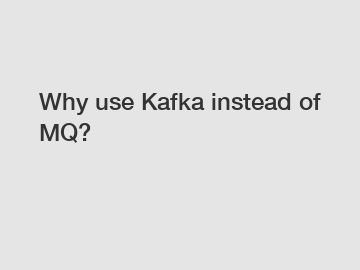Why use Kafka instead of MQ?
Why use Kafka instead of MQ?
If you are searching for a powerful and reliable messaging system for your distributed application, then Kafka should be your go-to choice instead of traditional message queue systems like RabbitMQ or ActiveMQ. Kafka has gained immense popularity among developers and enterprises due to its unique design and exceptional scalability. In this article, we will delve into the reasons why Kafka is favored over MQ systems and explore the implications and benefits of this choice.
The first and foremost reason to choose Kafka over MQ is its architecture, specifically designed to handle large-scale data streams. Kafka follows a publish-subscribe model, where producers write records to topics, and consumers subscribe to those topics to receive the data. This decoupled architecture allows for high throughput and fault tolerance, making it an ideal solution for real-time data processing. In contrast, MQ systems are more suited for point-to-point messaging, which may not be the best fit for scenarios requiring data streaming at scale.

Furthermore, Kafka's distributed nature sets it apart from traditional MQ systems. Kafka is designed to operate in a distributed cluster, enabling it to handle heavy workloads across multiple nodes. This distributed setup ensures both high availability and fault tolerance, as data is replicated and distributed across the cluster. In contrast, MQ systems typically rely on a centralized server, which can become a bottleneck under high loads or in case of server failures.
Another significant aspect of Kafka's design is its data persistence mechanism. Kafka stores all published records in a fault-tolerant and durable manner, making it suitable for use cases where data loss is not an option. This durability is achieved by writing data to disk and replicating it across multiple nodes in the cluster. On the other hand, MQ systems often rely on in-memory storage, which can result in data loss during server failures or restarts.
The seamless integration capabilities of Kafka also contribute to its superiority over MQ systems. Kafka's Connect API allows easy integration with various data sources and sinks, enabling developers to build robust and efficient data pipelines. Additionally, Kafka's ecosystem includes tools like Kafka Streams and KSQL, which provide stream processing and real-time analytics capabilities, further enhancing the value proposition of Kafka.
In conclusion, Kafka's unique architecture, scalability, fault tolerance, persistence mechanism, and integration capabilities make it a compelling choice for distributed data streaming over traditional MQ systems. As the demand for real-time data processing continues to grow, Kafka offers developers and enterprises a robust and reliable platform to handle large-scale data streams. Whether it be processing real-time analytics, building event-driven architectures, or implementing messaging systems, Kafka stands out as a powerful and effective solution in the ever-evolving world of distributed computing.
If you want to learn more, please visit our website Event Stream System Blogs, Event Stream Connectors, aws slack channel.

Comments